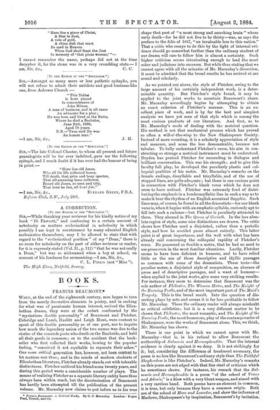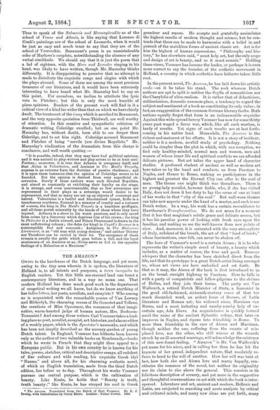BOOKS.
FRANCIS BEAUMONT.*
WREN, at the end of the eighteenth century, men began to turn from the merely decorative elements in poetry, and in seeking for what was of passionate human interest, revived the Eliza- bethan drama, they were at the outset confronted by the "mysterious double personality" of Beaumont and Fletcher. Coleridge and Lamb, Hazlitt and Leigh Hunt, were content to speak of this double personality as of one poet, nor to inquire how much the legendary union of the two names was due to the stories of the comrade poets who dwelt on the Bankside, and held all their goods in common ; or to the accident that the book- seller who first collected their works, bowing to the popular feeling, "conceived it not equitable to separate their ashes." Our more critical generation has, however, not been content to let matters rest thus ; and in the minds of modern students of Elizabethan literature, Fletcher already stands out with tolerable distinctness. Fletcher outlived his friend some twenty years, and during this period wrote a considerable number of plays. The means of realising Fletcher as a separate literary entity have thus always been within reach, but the discrimination of Beaumont has hardly been attempted till the publication of the present volume. Mr. Macaulay now claims to put before us in his true
• Francis Beaumont : a Critical Study. By G. C. Macaulay. London: Kegan Paul, Trench, and Co.
shape that poet of "a most strong and searching brain" whose early death—for he did not live to be thirty—was, as says the preface to the folio of 1647, "an invaluable loss to this nation." That a critic who essays to do this by the light of internal evi- dence should go somewhat further than the ordinary student of our drama will care to follow him is almost a certainty. Such higher criticism seems intoxicating enough to lead the most sober and judicious into excesses. But while thus stating that we cannot agree with all the minutim of Mr. Macaulay's dissection, it must be admitted that the broad results he has arrived at are sound and scholarly.
As we pointed out above, the style of Fletcher, owing to the large amount of his certainly independent work, is a deter- minable quantity. But Fletcher's style found, it may be applied to the joint works to ascertain Beaumont's share. Mr. Macaulay accordingly begins by attempting to obtain an exact criterion of Fletcher's manner. This is an ex- cellent piece of work, and is by far the best and simplest analysis we have yet seen of that style which is among the most curious products of our literature. And first, as to Mr. Macaulay's mode of dealing with the metrical question. His method is not that mechanical process which has proved so often a will-o'-the-wisp to the New Shakespeare Society. Instead of mere counting, it is a scholarly appreciation of style and measure, and none the less demonstrable, because not tabular. To fully understand Fletcher's verse, his aim in con- structing so strange a metrical instrument must be understood. Dryden has praised Fletcher for succeeding in dialogue and brilliant conversation. This was his strength ; and to give this faculty full play, he developed the peculiarly plastic and col- loquial qualities of his metre. Mr. Macaulay's remarks on the female endings, dissyllable and trisyllable, and of the use of stopped lines, are quite adequate ; but there is one curious point in connection with Fletcher's blank verse which he does not seem to have noticed. Fletcher was extremely fond of distri- buting the emphasis in a hendecasyllabic line in such a way as to make it bear the rhythm of an English accentual Sapphic. Such lines may, of course, be found in all the dramatists—for our blank verse is, when it begins with an emphatic syllable, curiously apt to fall into such a cadence—but Fletcher is peculiarly attracted to them. They abound in The Queen of Corinth. In the less abso- lute region of style, some nice distinctions are drawn. The critic shows how Fletcher used a disjointed, rather than a periodic style, and how he avoided prose almost entirely. This latter point is of great importance, and fits well with what has been already said concerning the colloquial rapidity of Fletcher's verse. He possessed so flexible a metre, that he had no need to use prose even in the most familiar situations. Lastly, Fletcher seems to have been deficient in humour, and to have relied little or the use of those descriptive and idyllic passages so common with some of the dramatists. These tests—the peculiar metre, a disjointed style of composition, an absence of prose and of descriptive passages, and a want of humour— when applied to the joint works, give some very striking results. For instance, they seem to determine that Beaumont was the sole author of Philaster, The Woman Hater, and The Knight of the Burning Pestle, and of the most important part of The Maid's Tragedy. This is the broad result. Into the question of dis- secting plays by acts and scenes it is far less profitable to follow Mr. Macaulay. These the ordinary reader will always misdoubt as critical subtleties ; bat it is a very different matter to be shown that Philaster, the most romantic, and The Knight of the Burning Pestle, the most humorous, play of the contemporaries of Shakespeare, were the works of Beaumont alone. This, we think, Mr. Macaulay has shown.
There is one point in which we cannot agree with Mr. Macaulay—that is, in his refusal to allow Beaumont the authorship of Salmacis and Hermaphrodite. That the internal evidence is clearly against it we deny. It is not strikingly for it; but, considering the difference of treatment necessary, the poem is no less like Beaumont's ordinary style than The Faithful Shepherdess is like Fletcher's. Indeed, Mr. Macaulay's remarks on this poem are not edged with that fine steel of criticism which he sometimes shows. For instance, his remark that the Sal- macis and Hermaphrodite is a poem "of the school of Venus and Adonis," is a blow with a very blunt weapon, and aimed with a very careless hand. Both poems have an element in common, it is true, but only because they have a common origin. Both are of the school of Hero and Leander, and show the influence of Marlowe, Shakespeare's by inspiration, Beaumont's by imitation.
'Thus to speak of the Salmacis and Hermaphrodite as of the school of Venus and Adonis, is like saying that Lorenzo di Credi's paintings are of the school of Leonardo, when it would be just as easy and much truer to say that they are of the school of Verrocchio. Beaumont's poem is an unmistakeable -echo of Marlowe's couplets, notwithstanding the absence of any verbal similitude. We should say that it is just the poem that
a lad of eighteen, with the Hero and Leander ringing in his head, was likely to have written, though Mr. Macaulay thinks ,differently. It is disappointing to perceive that no attempt is
made to distribute the exquisite songs and elegies with which the plays abound. Some of them are among the most precious treasures of our literature, and it would have been extremely interesting to have heard what Mr. Macaulay had to say on this point. For ourselves, we incline to attribute the lyric vein to Fletcher; but this is only the most humble of pious opinions. Readers of the present work will find in it a critical view of a kind far wider than that on which we have chiefly -dwelt. The treatment of the &any which is ascribed to Beaumont, and the very apposite quotation from Thirlwall, are well worthy of attention. In this creative and sympathetic criticism of dramatic writing Coleridge excelled ; but on one point Mr.
Macaulay has, without doubt, been able to see deeper than Coleridge, and to set him right. Coleridge accused Beaumont and Fletcher of being "servile jure divino Royalists." Mr. Macaulay's vindication of the dramatists from this charge is conclusive, and well worth quoting :—
"it is possible, indeed, that they may have had political opinions, and it was natural to play-writers and play-actors to be at least anti- Puritan; moreover, it is true that Arbaces is arrogance itself, and that ZEcius in Valentinian, and Amintor in The Maid's Tragedy, express in an extreme form the doctrine of passive obedience; and it is upon these instances that the opinion of Coleridge seems to be founded. But the opinion is derived from very superficial ob- servation. Surely if these authors were such devoted Royalists, and aimed so constantly at exhibiting their loyalty on the stage, it is strange, and even unaccountable, that so few sovereigns are represented in their plays as a sovereign would desire to be represented, and that so many are set up as objects of contempt and hatred. Valentinian is a lustful and bloodstained tyrant, Rollo is a treacherous murderer, Ferranti is a monster of cruelty and a torturer -of women, the king in The Maid's Tragedy is a heartless profligate, and all these perish miserably by the hands of those whom they have injured. Arbaces is a slave to his worst passions, and is only saved from crime by a discovery which deprives him of his crown ; the king in Philaster is a feeble coward, and Prince Pharamond is drawn in the most unflattering colours ; the duke (or king) in Cupid's Revenge is a contemptible fool and coxcomb ; Antigonns, in The Humorous Lieutenant, is an "old man with young desires ;" and neither Thierry nor Theodoret can be envied in their lot. The arrogance of these tyrants is usually the pride which goes before a fall, and the loyal sentiments of an Amintor or an "Ecius serve as foil to the opposite feelings of a Melantius or a Maximus."



































 Previous page
Previous page